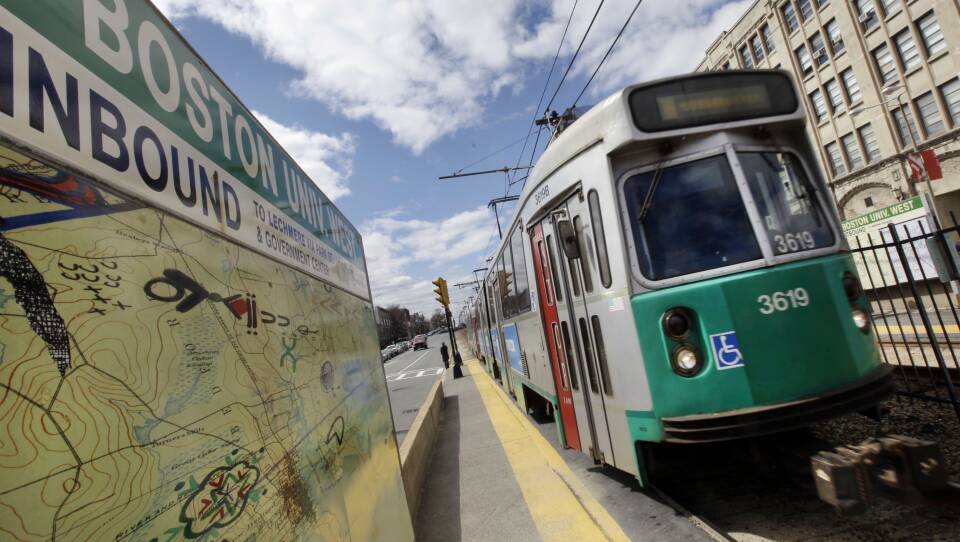The MBTA has approved a reduced fare program for low-income riders. The program will offer discounts on fares across all transit modes in the MBTA service area: subway, bus, commuter rail, the RIDE paratransit service, and ferries.
Officials answered questions about the proposal at a news conference earlier this year. Here’s what you should know.
Who qualifies for the reduced fare?
Massachusetts residents ages 18-64 with incomes below 200% of the federal poverty level will be eligible. Under the current guidelines, that means individuals who earn about $30,000 or less, and about $62,000 or less for a four-person household.
The MBTA will determine eligibility by confirming a rider’s enrollment in another income-based program, including the Supplemental Nutrition Assistance Program and MassHealth plans.
How do riders apply?
Riders will be able to apply online starting Sept. 4, 2024, by filling out a simple form, which the MBTA says will take less than 5 minutes to complete.
From there, the agency will verify a rider’s identity using information from the Registry of Motor Vehicles and their eligibility based on data from other state departments.
Once approved, riders will be able to select whether they want to pick up their reduced fare card or have it mailed to them.
“Of course, we know that an online application won’t work for everyone. Some folks don’t have RMV IDs and should prove identity using passports, green cards, and other methods. And some folks would rather go in person to talk to a human about how to apply,” said Stephen Povich, the MBTA’s director of fare policy. “We’re working to find community partners who can support this effort.”
How much is the fare reduction?
Low-income riders will receive a roughly 50% discount on the standard fares and passes, similar to fares currently offered to students and seniors.
| Ride type | Base fare | Reduced fare |
| —————————————————— | —————————— | —————————— |
| One-way subway | $2.40 | $1.10 |
| One-way local bus | $1.70 | $0.85 |
| The RIDE (standard) | $3.35 | $1.70 |
| Commuter rail zone 6 | $10.50 | $5.25 |
How do riders use the reduced fare card?
Riders enrolled in the program will receive a reduced fare CharlieCard. This means when loaded with stored value, the rider can pay half fares at a fare box or fare gate, and through sales channels like fare vending machines. They can also be loaded with $10 seven-day passes and $30 monthly passes.
The card will be active for one year. If the rider reapplies for the reduced fare program and is accepted, that same card will remain active.
How many people will benefit?
The T estimates around 30,000 riders will enroll in the first year. That number is expected to grow to 62,000 in five years.
How much will this cost the T?
This program is expected to cost the MBTA close to $60 million a year upon full enrollment.
The Healey-Driscoll administration currently has proposed $45 million in funding from the Fair Share Amendment, sometimes known as the millionaires tax, for the fiscal year 2025 budget. Officials say full enrollment could take five years, so the $45 million is expected to cover the initial cost of the program. Additional funding would have to be decided by the Legislature.
How will low-income fares boost ridership?
Povich said they expect participants in the program to ride the T more often. That’s been the case with other recent efforts.
“We expect that riders enrolled in the program will increase their ridership 25 to 30%,” he said. “In terms of the fare-free bus program in partnership with the city of Boston, we’ve seen about a 20% increase in ridership on the 23, 28, and 29 bus routes.”
Mayor Michelle Wu has announced she will extend the fare-free bus pilot for another two years, until 2026.
What’s been the reaction to the low-income fare proposal?
LivableStreets Alliance Executive Director Stacy Thompson said the program is a “huge step” toward making the MBTA more equitable.
“We know that the MBTA is a lifeline for thousands of people,” she said, “This program will make it easier for all people, regardless of age or ability, to get where they need to go.”
Other transit advocates agree this program will help many people across Greater Boston.
“Reduced fares will be transformative for low-income riders throughout the MBTA service area and on all modes of public transit, and especially for communities of color facing historical burdens of exclusion and poverty,” said Community Labor United Senior Organizer Ziquelle Smalls.
“Frederick Douglas said, ‘Power concedes nothing without a demand, it never did and never will.’ We are witnessing the result of demanding fare equity from the powers that be,” said Mela Bush, co-chair of the Fairmount Indigo Transit Coalition and former director of the T Riders Union. “The low-income fare policy has come at a time of skyrocketing costs on food, housing, etc. Saving $500 a year on transportation for lower-income transit-dependent people can mean so much!”





